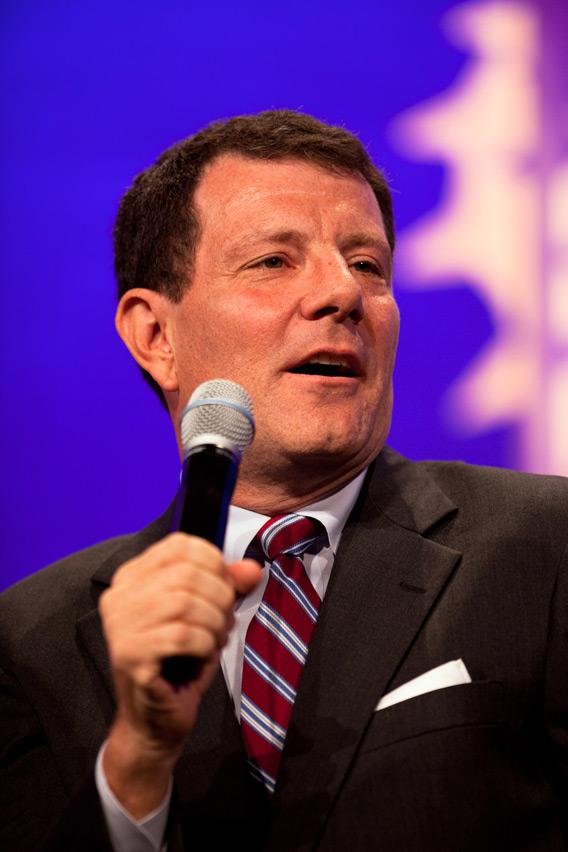Last week, Nicholas Kristof wrote a column about Americans losing faith in free markets and the financial industry. He described how he was startled during a visit to Swarthmore College, where a student asked him whether it was immoral to seek banking jobs. Using the student as a foil, Kristof worried that “America’s grasping capitalists are turning young Americans into socialists.” He advised liberals to “be wary of self-selecting” out of jobs in the financial industry, and cautioned students not to “mock their classmates who choose Citigroup over CARE.”
I’m the student who asked Kristof the question. He’s wrong. There’s no crisis of faith in capitalism, or of liberal students shunning jobs in finance.
Kristof cites a Pew poll taken last year. “Only 50 percent of Americans reacted positively to the term capitalism,” he worries. Furthermore, “Among Americans aged 18-29, more had a negative view of capitalism than had a positive view of capitalism.”
There’s nothing new in these numbers. Capitalism has always been controversial. In Modern American Capitalism: Understanding Public Attitudes and Perceptions, the authors found that in 1989, 32 percent of Americans agreed that “Capitalism denies the masses property in life, liberty, and estate.” More than one-half agreed that “Capitalism must be altered before any significant improvements in human welfare can be realized.” And—surprise, surprise—college students were substantially more likely than the rest of the population to believe that capitalism was unjust. That was true in 1980 as well as 1989. When you look at the 2011 and 1989 data side by side, it’s remarkable how little the numbers have changed.
There isn’t even evidence of an overall change since 2007, before the financial crisis. That year, a Financial Times/Harris Poll asked respondents whether “a free-market capitalist economy … is the best economic system or not.” Just 49 percent of Americans agreed that it was. That’s almost identical to Pew’s 2011 finding.
Kristof also claims that American hostility to business is on the rise. He cites the Edelman Trust Barometer, which found last year that “only 46 percent of Americans had confidence in business to do the right thing.” That number is down from 2010. But it’s 10 percentage points higher than it was in 2009. According to Edelman, in 2011 Americans trusted business more than they did in 2002 and at the same level (46 percent to 48 percent) as in 2005, before the recession.
Nor is it clear that Kristof is right about today’s undergraduates souring on finance jobs. While fewer undergraduates from top institutions have gone directly into finance since the recession, most of the decline occurred between 2008 and 2010, when the industry began shedding jobs and lowering recruiting targets. At Princeton, 46 percent of the 2006 graduating class went into finance, compared to just 33 percent who went into finance in 2009. But by 2010, with the financial industry recovering, the numbers entering finance had risen back to 2005 levels.
Other schools’ numbers tell a similar story. At Yale, from 2008 to 2010, the percentage of students entering “finance/business” jobs dropped from 19 to 11. But the percentage of students entering “industry” professions during the same span increased from 7 to 16. “Industry” encompasses professions from management consulting to sales and marketing, and the Yale institutional researchers interpreted the data simply: “Due to the economic downturn, graduates shifted from jobs in business and finance to jobs in industry instead.” During the same two-year span, the percentage of Yale students who went into education, public service, or social work stayed constant. There is thus little reason to think that the precipitous drop in finance jobs at Yale had anything to do with students rejecting either finance or capitalism. In fact, there was a larger absolute drop in the percentage of Yale students seeking finance jobs during the early 2000s recession than there was between 2008 and 2010.
Bloomberg expects finance firms to begin hiring even more undergraduates in 2012, and there is every reason to expect that, if the economy makes a full recovery, students from top undergraduate institutions will enter the financial industry at the same rates they did before the recession.
Kristof writes more than anybody about the importance of good teaching, smart government employees, and the great work of many international NGOs. All of those goals are threatened when as many as one-half the students at top universities go directly into consulting and finance jobs. So the next time a student asks Kristof whether it’s moral to go straight into banking, maybe, instead of worrying about an anti-capitalist climate, he should counsel the student to spend a couple of years doing something different.
